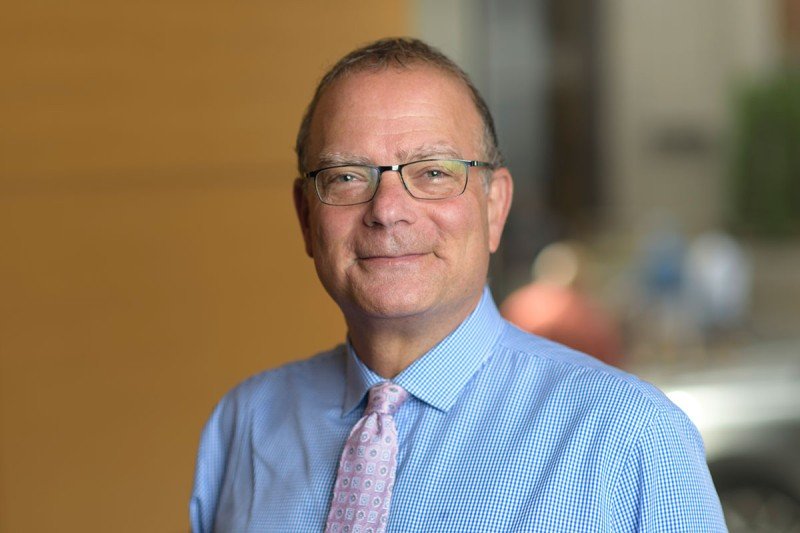
Children with cancer face the disease during a time of intense growth and development. At Memorial Sloan Kettering, pediatric neuropsychologist Stephen Sands helps young patients with the academic, social, and emotional challenges that can arise from cancer and its treatment. Dr. Sands, who completed his fellowship at MSK 20 years ago, tells us about his work here.
How would you describe what you do?
I provide comprehensive assessments and recommendations for patients and survivors to encourage their success at school and beyond. Parents are understandably focused on their child’s health during treatment and not really thinking about school. That’s my job: to have one eye on providing support during medical treatment and the other on their transition back to school. But it’s not just about grades. It’s just as much about how they become social and develop intimacy, assume leadership roles — all to help them be indistinguishable from their peers. These patients are in school for around seven hours a day, five days a week for years, so when our efforts and advocacy help them flourish, that’s an extremely proud moment that can often impact the direction of their lives.
I also work with pediatric oncologists to support research on new cancer treatments designed to have fewer side effects. In addition, I perform bedside evaluations to monitor children’s cognitive clarity if a treatment is making them temporarily confused.
What happens the first time you meet a patient?
I give standardized tests for IQ, reading, spelling, math, attention, memory, executive functioning, and other areas depending upon each child’s age, medical diagnosis, and treatment. The most common areas of difficulty for survivors include struggling to maintain their attention and concentration, as well as needing more time to finish quizzes, tests, and assignments. This can cause them to fall further and further behind their classmates over the years if nothing is done to support them. We also don’t want to lose sight of how they’re thinking and feeling. If somebody’s nervous, sad, or moody, it’s going to bring every aspect of their functioning down.
The first time I meet with patients, I try to make them feel comfortable and explain that this isn’t a test like the ones at school. I want to figure out how they learn best. Some kids are better with visualization; some are better with verbal instruction. I want to see all the things they’re really good at it, and if there’s anything that’s hard for them, so we can figure out how to make those things easier.
After that first meeting, what happens?
I’ll meet with kids once or twice at MSK’s Counseling Center for around three hours each visit. I give parents recommendations for their child — this may include being in a smaller class, getting tutoring, receiving extra time, engaging in therapy, and so on. Parents are then given a detailed written report that is shared with the school to make sure the school is providing the right accommodations. I stay in close contact with families to provide advocacy and ensure that students are receiving the services to which they are entitled. Patients return for follow-up assessments approximately every two years so we can monitor their progress and fine-tune their plan.
What drew you to pediatric neuropsychology?
I really enjoy the interaction with patients and families and am constantly reminded of how privileged I am to be working with such a resilient population. Supporting patients in the important transition from the hospital back to school is very compelling to me. I enjoy connecting with a wide range of children and adolescents to make them feel comfortable and elicit their best performance. Then, like a puzzle, we can figure out how to use their strengths to overcome whatever weaknesses they may have.
You completed your fellowship at MSK 20 years ago. What brought you back?
I wanted to continue challenging myself with new and important professional responsibilities. I was thrilled about the opportunity to build a program providing neuropsychology services to pediatric patients at MSK. It has felt like coming home, as the majority of pediatric oncologists and many of the psychiatrists and psychologists I met during my fellowship are still here.
In addition, I wanted to return to MSK to collaborate with our pediatric oncologists on clinical trials studying the field of late effects from pediatric cancer treatment. Improving cure rates while lessening late effects is one of the biggest things that gets me out of bed in the morning.
Cancer can have a devastating impact on a patient’s loved ones. How do you support families?
Parents understandably tend to protect their children to minimize anxiety and distress. What’s fascinating is that the kids also protect their parents, saying things like, “When I get sad, my mom doesn’t want to talk about it, so I’m not going to say anything to upset her.” An important part of our role is to facilitate open and honest conversation so that both parents and children can appreciate a wide range of honest thoughts and feelings. That tends to free up a lot of energy being used to keep those emotions out of sight. We have a lot of supportive resources here and we want to make sure that we provide parents and children — both are important — with everything they need during treatment and well into survivorship.



